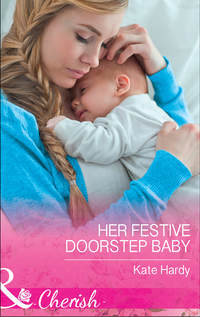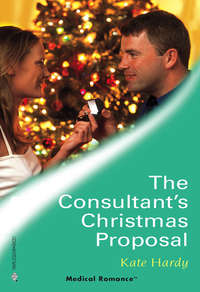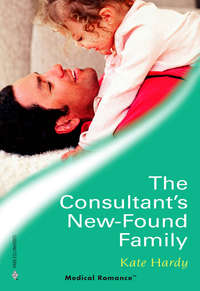
Полная версия
The Doctor's Lost-and-Found Bride
Yet she still used her maiden name in the department. Maybe she hadn’t yet remarried. Or maybe she’d decided to keep her maiden name for work.
Whatever.
It was none of his business any more.
All the same, it shook him. Especially when a man came walking down the corridor towards them, kissed Marina lightly on the mouth and scooped the child from her arms.
‘Daddy!’ the little girl said, beaming as the man kissed her and lifted her onto his shoulders.
Marina tucked her arm through his and they walked off together, chatting easily. Looking exactly like the close, loving family they obviously were.
Exactly like the close, loving family he and Marina had planned to have.
Max swallowed the bile that had risen in his throat. Now he understood why Marina had left her shift dead on time. She’d had to pick up her daughter from the hospital nursery before meeting her partner.
What made the whole thing so much worse was that, if circumstances had been very slightly different, Max would’ve been the one meeting Marina with a bright, lively pre-school child, and maybe a baby with chubby hands and a wide, wide smile. He would’ve been the one they smiled at, the one they greeted with a kiss.
He swore under his breath. He’d promised himself that he was over it, that he could cope with working in England again. But seeing that little tableau made it feel as if someone had cracked his heart wide open and stomped on it.
Marina had a child. With someone else.
He’d thought that he’d reached the depths of pain. Now he knew there was more—and it felt as if he were drowning. Someone else had the life he’d planned, the life he’d wanted: Marina, their baby, a fulfilling job.
Why the hell hadn’t he tried harder to make it work?
Because he’d been an idiot.
Because he’d been hurting too much at the time to work out what he’d needed to do—what they had needed to do—as a couple.
And now it was too late. Way, way too late.
There was only one way of getting this out of his system. So, instead of making himself a sandwich when he got home, Max grabbed his gym gear and headed out again. What he needed was a workout that would leave him too damn tired to think. He’d sleep on it, let his subconscious come up with a way of dealing with the fact that Marina Petrelli was back in his life—and she was very firmly off-limits.
Chapter Two
THE roster fairy definitely wasn’t on his side, Max thought the next morning as he walked into Resus and saw his team.
To think he’d been so cool and calm yesterday, asking Marina if it would be a problem for her, working in the same department. He’d been so sure that he could handle the situation.
Though, that had been before he’d seen her with her daughter.
And he was shocked by how much that thought still hurt, like a bruise that went right through his soul.
‘Good morning, Dr Fenton,’ Marina said.
She sounded bright and breezy, as if nothing was wrong—although he’d noticed that her smile didn’t quite reach her eyes, and she was using his formal title rather than his first name. OK; he’d take the lead from her. Bright, breezy and surface-friendly it was—even though he felt like punching something. He forced himself to unclench the fists in his pockets. ‘Good morning, Dr Petrelli.’
‘We’ve just had a shout,’ she told him. ‘RTC, elderly female passenger, ETA six minutes.’
‘Any details?’
‘Query fracture and internal injuries. They’ve put a line in and she’s on a spinal board.’
Max met the ambulance crew at the door and quickly went through the handover, and the team swung into action to treat Mrs Jennings. Clearly they were used to working together and, whatever the problems between himself and Marina, she obviously took her job seriously, and she hadn’t been exaggerating when she’d said that she could push the personal stuff into the background and put her patient first. Max quickly discovered that over the last four years Marina had become a fine doctor, confident and capable, and whenever he was about to give her some instructions he found she was already doing it, having second-guessed him.
As they assessed their patient for hypovolaemic shock—Max wasn’t happy with her blood pressure or the capillary refill—they both noted the pattern of bruising across her abdomen, the lap-belt imprint. On examination, Mrs Jennings’ abdomen was tender. Not good.
‘I’m not happy with this,’ Max said quietly to Marina.
‘I’d need to see the X-ray to confirm it, but my guess is that the impact fractured her pelvis,’ Marina said, equally quietly.
He nodded. ‘There may be some splenic involvement as well, or even damage to other organs. We need a CT scan and an X-ray to see what’s going on.’
‘Agreed. Let’s get her stabilised first,’ Marina said.
Quietly, Max asked Stella, their senior nurse, to bleep the orthopaedic-surgery team and put Theatre on standby, and then he turned back to the patient. ‘Mrs Jennings, I’m going to put a mask over your face,’ he said, ‘to give you some oxygen, which will help you to breathe more easily. And I’m going to give you something to help with the pain, so it makes things a bit more comfortable for you while we take a look at your injuries. If you’re worried about anything, just lift your hand and we’ll take the mask off for a few moments so you can talk to us, OK?’
Mrs Jennings whispered her consent. Max fitted the oxygen mask over her face and gave her analgesia through the IV line that the paramedics had put in, while Marina inserted a second IV line and set up a drip. Marina took blood samples for rapid cross-matching, all the while talking to Mrs Jennings, reassuring her and assessing her. Max was impressed by Marina’s calm, kind manner. Although they were faced with a potentially life-threatening emergency—compound pelvic fractures, especially if there were abdominal injuries as well, were associated with a mortality rate of more than fifty per cent—Marina made sure that Mrs Jennings didn’t realise how worried they all were. She behaved as if this was a completely everyday occurrence, and nothing more worrying than a dislocated elbow, which meant that their patient relaxed rather than panicking—and in turn that made their investigations just that touch easier.
If it wasn’t for the personal stuff between them, working with her would have been a dream.
As it was, it was a living nightmare. Her voice echoed through his head: Let’s go and meet Daddy.
Daddy. Daddy.
It should’ve been him.
He shook himself. This wasn’t the time or the place. And there was nothing he could do to change the situation, so it was pointless ripping himself apart over it. He forced himself to stay in professional mode, and reviewed the X-rays with Marina against the lightbox. ‘Classic open-book fracture,’ he said.
‘That’s fixable. What worries me more is that her BP is still dropping.’
‘Which means she has internal injuries.’ He grimaced. ‘We don’t have time to wait for a CT scan, and even a DPL’s going to be risky.’ A diagnostic peritoneal lavage or DPL was a quick way of checking for internal haemorrhage when a scan would take too long. ‘We need to get her up to Theatre now. Fast-bleep the orthopods, please, Stella,’ he said to the nurse. ‘I’m sending Mrs Jennings up.’
He turned to Mrs Jennings. ‘The X-rays show that the accident broke your pelvis,’ Max explained gently, holding her hand and looking into her eyes. ‘I’m going to send you up to Theatre so the surgeons can fix it for you. We want to keep you as still as possible on the way, so we’re going to put sandbags either side of you to make sure you don’t move on the trolley.’
‘But don’t be afraid,’ Marina added. ‘It won’t be uncomfortable, and it’s pretty much routine-procedure for anyone who’s got a break right there. I’m going to come up to Theatre with you and introduce you to the surgical team.’ She took Mrs Jennings’ other hand. ‘And I’m not going to leave you until you’re happy that you know what’s going on. Is there anyone you’d like us to call for you while you’re with the surgeons?’
Mrs Jennings reached up with her free hand and lowered the mask. ‘My daughter,’ she whispered.
Marina made a note of her name and number. ‘I’ll call her myself as soon as you’re in Theatre,’ she promised.
‘And my friend,’ Mrs Jennings whispered. ‘The one who was driving me. Was she hurt in the accident?’
‘She hasn’t been brought in here,’ Marina said. ‘But I’ll talk to the ambulance crew and find out what happened and how she is. Then, when you’re out of Theatre, I’ll come and see you and let you know what’s going on. Now, let me put this mask back on you and make you more comfortable.’
When Marina returned from taking Mrs Jennings up to Theatre and phoning her daughter, Max was about to send her on a break, then the phone in Resus rang.
Stella answered it. ‘Marina, it’s the nursery,’ she said, handing the phone to Marina.
‘Marina Petrelli speaking.’
Even though Max tried hard not to listen in, he couldn’t help noticing that Marina went white.
‘What’s happened? Right. I see. Yes, of course.’ She replaced the receiver and blew out a breath. ‘Phoebe’s just thrown up everywhere. The nursery needs me to collect her and take her home, as in right now.’ She bit her lip. ‘Dr Fenton, I know I’m rostered in here with you today, and we’re short-staffed, but—’
‘Just go,’ Max cut in. ‘The child obviously needs you.’ He couldn’t bring himself to say ‘your daughter’; the words made his throat feel as if it were closing, and he was angry with himself for not being able to get a grip. He should be happy that Marina’s life was on track and that she’d clearly found a partner who loved her the way she deserved to be loved. The fact that he hadn’t moved on and found someone else himself was his own stupid fault, and it wasn’t fair to blame her for his own shortcomings. ‘I’ll arrange cover.’
‘Thank you.’ This time, her smile was genuine, gratitude, clearly mixed with fear for her child; she looked worried sick. And for good reason; he’d been told that the previous month the hospital had had to put a ban on visitors because so many patients and staff had been struck down by the winter vomiting-virus.
He didn’t have time to add that he hoped it was nothing serious, because Marina had already left, walking very quickly, the way junior doctors soon learned to do so they could cover the ground between the on-call room and a department at maximum speed and with minimum risk.
To his surprise, Marina was back in the department again within two hours.
What the hell was she doing here? Her daughter was ill and needed her, and yet Marina was at work. Her priorities were way out of line. ‘Shouldn’t you be at home?’ he demanded.
Marina shook her head. ‘It’s OK. Mum’s taken over. I rang her on the way to collect Phoebe.’
‘Your mother’s looking after Phoebe?’ He stared at her in disbelief. Just what was going on here? He knew that family was important to Marina, and given the way she’d fallen apart when she’d lost their baby he would’ve bet good money that she would always put her child before her job—before anything else. How could she just dump her sick daughter on her mother’s doorstep?
Then again, the cost of living was high in London. Perhaps she and her partner were struggling financially and needed her salary to survive—what was left of it, after the cost of childcare.
‘What about the child’s father?’ The question was out before he could stop it.
She looked defensive. ‘Neil’s really busy at work. I can’t expect him to drop everything. Not when—’
‘Save it. It’s none of my business,’ he cut in. He knew he was being rude, but he was angry—with himself, as much as with her. Why couldn’t he get his head round the fact that Marina had moved on, that she’d found happiness with someone else? Why was he so selfish that he couldn’t be pleased for her, or relieved that she wasn’t stuck in the same limbo of misery that he was?
She said nothing, but her face looked pinched, and her dark eyes were wary whenever she spoke to him for the rest of the afternoon.
As Max’s anger faded, he realised how just unfair he’d been. Which was why he sent Marina off the ward at five o’clock sharp.
‘I can’t leave when we still have a patient to treat,’ she said in a low voice.
‘We’ll manage without you.’
‘But—’
‘Phoebe needs you. Go home.’
‘But—’
‘Go home,’ he repeated, trying to make his voice gentle. It was obvious that Marina was torn between her child and her duty; he had no intention of making the choice any more difficult for her.
But he thought about it for the rest of the evening—and wondered. Had their child been ill, how would he have acted? He was pretty sure he knew—and his choice wouldn’t have been the same as Neil’s.
Then again, he hadn’t exactly been a perfect husband to Marina. He hadn’t been there when she’d needed him. Yes, work had been busy, but he’d used his career as an excuse to avoid facing the misery at home. He hadn’t known how to make things better, for either of them, so he’d put his job first. Her second husband was clearly out of the same mould, so Max knew he was hardly in a position to criticise the guy. It didn’t stop him feeling angry about the situation, though, or thinking that Marina deserved better.
Wednesday; thank God it was Wednesday, Marina thought. As part of her training as a specialist registrar in emergency paediatrics, her boss had arranged for her to spend one day a week in the Children’s Assessment Unit. She was covering in part for Katrina Morgan, who was on maternity leave. Rhys Morgan—the consultant, who was also Katrina’s husband—had taught her a huge amount.
Marina loved every second of the time she spent on the CAU and always looked forward to it, but the fact that she didn’t have to face Max today made it even better.
‘Are you OK, Marina?’ Rhys asked. ‘You look a bit pale.’
‘I’m fine,’ Marina fibbed with a smile. ‘Just tired.’ She hadn’t slept particularly well the previous night, brooding about Max and how hostile he’d been towards her. Yes, she’d been the one to walk out—but they were both equally responsible for the collapse of their marriage. And hadn’t they agreed that they were going to put their patients first? If he carried on like that, there was no way they’d be able to work together—and it wouldn’t be fair on their patients or the rest of the team.
‘Not studying too hard, I hope?’ Rhys said.
‘No, just worrying about my sister.’ It was true: just not the whole truth. Not that she was going to burden Rhys with the mess of her personal life. ‘And, yes, I know she’s in good hands and Theo Petrakis is the best maternity specialist for miles.’ Theo’s wife Madison and Rhys’s wife Katrina were cousins, but were as close as sisters—though Marina knew that Rhys would have put the family connection aside when he’d assessed his colleague’s medical skills, just as she would have.
‘But Rosie’s still your sister—and where your own family’s concerned all your medical knowledge goes out of the window. You end up being like a medical student again, poring through textbooks and convincing yourself that you can see the symptoms of really rare complications,’ Rhys said, smiling back. ‘Katrina says I’m going to be a nightmare when she goes into labour, just as Theo was with Maddie.’
‘Doctors, eh?’ Marina said wryly. ‘How is Katrina, by the way?’
‘Blooming,’ Rhys said. ‘It’s our first anniversary next week. I had planned to take her to Venice for the weekend, but with her being seven-and-a-half months’ pregnant I don’t want her to fly. So instead we’re going to Southwold, on the coast of Suffolk.’ He grinned. ‘And, yes, I know that this cold snap means that the east coast is going to feel like Siberia. We’ll just have to tough it out and snuggle up in front of a proper log-fire in the little thatched cottage I booked.’
‘That sounds lovely. Really romantic,’ Marina said, trying to keep the wistful note out of her voice. Rhys was deeply in love with his wife and had planned something special to celebrate their first anniversary, whereas she and Max hadn’t even made it to their first anniversary.
They hadn’t even made it to six months before their marriage had imploded.
And now he was back in her life, and all her feelings were turned upside down again. Anger, hurt, longing, love and hate, all shaken together so thoroughly that she couldn’t work out which was which.
She pushed the thought aside. ‘Righty. What do you have for me this morning?’
‘Severe asthma—cold-induced. Several cases, actually.’
‘And if it isn’t brought back under control properly they could end up with silent chest—in which case they’ll be downstairs with my lot,’ Marina said. With asthma, the child’s airways were inflamed, and responded rapidly and strongly to stimuli, so the child wheezed and coughed; the airways narrowed so much that the child couldn’t breathe out properly. The child might then panic and the situation could spiral. If it got really out of control, the wheezing could stop, which was far more dangerous. ‘Silent chest’, as it was known, meant that the asthmatic patient wasn’t moving enough air through their lungs to even create a wheeze—and that was life-threatening.
‘And then, once you’ve stabilised them, back up with me for admission and overnight observation…’ Rhys began.
‘Because if there’s a history of severe attacks there’s a very good chance that a child who’s had an attack during the day will have another one at night,’ Marina finished.
‘Exactly,’ Rhys said. ‘So part of today is going to be about prevention—talking to the parents about using their inhalers properly, how to use them and when. And it’s worth making the point that the steroids we give aren’t the same as body-building steroids—these are the ones that are produced naturally in the body.’
Marina nodded. ‘And we’ll make a note for the GP and health visitor.’
Rhys smiled. ‘Working with you is almost like working with Katrina—she’s spot on about kids, too. You know, I’m looking for someone to cover her maternity leave properly. Working up here for a while would be really good for your career development.’
Marina shook her head. ‘Ellen agreed to let me work here for a day a week. I’m not sure she’d go for a year’s secondment.’
‘I can talk to her, if you like? Think about it,’ Rhys said. ‘The offer’s open for a couple of weeks.’
‘Thanks.’ It was good to know that she had a potential bolthole. Working with Max and dealing with all the memories would’ve been tough at the best of times but, coming on top of her worries about Rosie and the baby, it just ratcheted up the tension.
At least here in the CAU she could relax.
And she could try not to think of Max.
Chapter Three
ON THURSDAY morning, Max was walking into the department when he heard Kelly on Reception say, ‘Hey, Marina! How’s Phoebe doing?’
‘She’s on the mend. It’s just a tummy bug.’ Marina smiled. ‘That’s the worst thing about being a medic—you know the worst-case scenarios, and instead of seeing a simple tummy bug you imagine it’s the winter vomiting virus and all the complications that go with it.’
Max knew exactly what she meant, though sometimes medics went the other way, going into complete denial when faced with the evidence—just as they had done four years ago. They’d managed to convince themselves that Marina wasn’t having a miscarriage, that the baby they hadn’t planned but had both wanted so much would be just fine…And when they’d finally had to face the truth it had hurt even more.
‘Though Rosie’s pretty upset that she’s not getting her usual visitor on the ward this morning. I rang her at breakfast, so Phoebe could say hello down the phone, but it’s not the same as being able to cuddle her.’
Max knew he really shouldn’t be listening in—it was nothing to do with him any more—but he’d always liked Marina’s elder sister. Unless Rosie had changed career and become a medic like Marina, it sounded as if something was wrong. Why would Rosie be in hospital? And why was Marina taking her daughter to visit her sick aunt every single day?
‘How’s Rosie doing this morning?’ Kelly asked.
‘She’s fine. Missing Phoebe and Neil like crazy, of course, but everyone knows she won’t stick to bed rest at home.’ Marina spread her hands. ‘I mean, you can’t if you have a toddler as lively as Phoebe.’ She laughed. ‘Mum’s always telling Phoebe that she’s exactly like her Aunty Rina was at the same age—covered in glitter and paint half the time, and pedalling round on her tricycle the other half.’
Everything suddenly fell into place for Max, and for one crazy moment he found himself on the point of whooping with delight and doing a happy dance all round the department.
The toddler Marina had been carrying—the one she’d gone to pick up from the nursery—was her niece, not her daughter.
As Rosie had the same colouring as Marina, and similar features, of course there’d be a strong physical resemblance between aunt and niece. And that in turn meant that the man Marina had kissed in the corridor had been her brother-in-law, not her partner. The Petrelli family had always been warm and tactile, and Max had kissed Marina’s sister, mother, aunts and grandmother exactly the same way himself before their marriage had fallen apart.
How stupid he’d been.
Then again, Max had never been able to think straight around Marina. Not from the moment he’d met her as a wet-behind-the-ears junior doctor who made very sure she pulled her weight on the team and did her best to reassure her patients. They’d gone for a coffee after that first shift, and had dated every night after that. The more time he’d spent with her, the more deeply he’d fallen in love with her.
Small wonder that they’d gone to bed together within a week and had moved in together within a month. They hadn’t wanted to spend a single moment apart.
Yet they’d spent the past four years as far apart as they could be: Marina in London, and he moving from disaster zone to disaster zone, pushing himself to the limit so he wouldn’t have to think about how much he’d lost.
He closed his eyes briefly. Now wasn’t the time or the place. He and Marina were going to have to talk about it, but not now, and definitely not here. Right now, he had a job to do. And so did she.
Marina was rostered on the children’s section of the emergency department that morning; that was good, because it meant she didn’t have to see Max. Not unless there was a really difficult case where she needed a second opinion. But she was in luck: her first case was a toddler who’d stuffed a plastic bead up her nose, her second was a child with a cough that she suspected was asthmatic, and her third was one who’d fallen in the playground and gashed his arm deeply enough to need stitches and a lot of reassurance. All things that needed a bit of time, reassurance and TLC as well as medical treatment, and she knew she was perfectly capable of dealing with all of them on her own.
Everything was fine until she took her break. The second that she made herself a mug of coffee in the kitchen, Max walked in, as if he had some weird kind of radar that told him exactly when she’d be there.
‘How’s Phoebe?’ he asked.
‘Doing OK, thanks. Mum’s looking after her today again.’
He made himself a coffee, then took a bar of chocolate from the pocket of his white coat, snapped it in half and handed half to her.
She accepted it without thinking, the way she always had when they’d worked together. ‘Thanks.’ Then she stared at the chocolate, suddenly realising what they’d both done.
Just like old times.
Except they’d both come a long way in the last four years.
‘I didn’t have time for breakfast this morning,’ he said with the quirky smile that had once made her knees melt.










